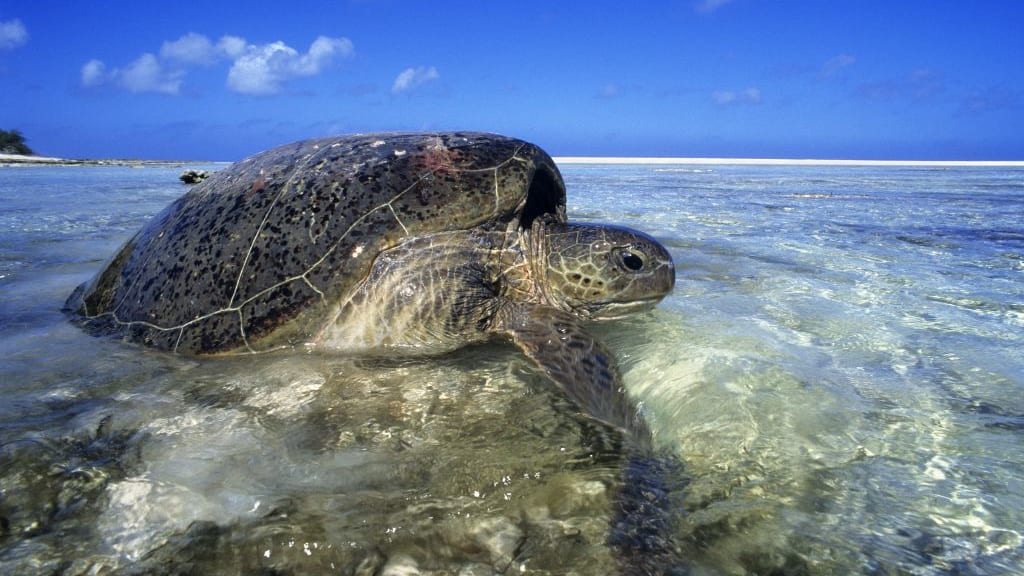In the Seychelles, conservation efforts are paying off for the endangered green turtle


A free daily email with the biggest news stories of the day – and the best features from TheWeek.com
You are now subscribed
Your newsletter sign-up was successful
There is a welcome and wonderful sight appearing on beaches in the Seychelles.
The endangered green turtle is making a comeback here, after several decades of protection and close monitoring. Turtle hunting was banned in the Seychelles, an archipelago of 115 islands off the coast of East Africa, in 1968, but it was a slow recovery. In the early 1980s, researchers would find just one or two turtle tracks on a beach, but by the mid-1990s, there would be 10 to 20.
It's only been up from there. This month, a new study was published in Endangered Species Research about the Aldabra Atoll in the Seychelles. Researchers found that in the late 1960s, the annual number of green turtle clutches was in the 2,000 to 3,000 range, and that increased to more than 15,000 in the late 2010s.
The Week
Escape your echo chamber. Get the facts behind the news, plus analysis from multiple perspectives.

Sign up for The Week's Free Newsletters
From our morning news briefing to a weekly Good News Newsletter, get the best of The Week delivered directly to your inbox.
From our morning news briefing to a weekly Good News Newsletter, get the best of The Week delivered directly to your inbox.
"There's potential for this population to double, triple, we're not even sure," lead author Adam Pritchard from the University of Exeter told Popular Science. "This could just be the start. It's amazing that, after slower growth in the beginning, there's been this real explosion in recent years."
The Aldabra Atoll has one of the world's largest green turtle populations, and in addition to the hunting ban, the fact that the area was designated a UNESCO Heritage Site in 1982 has helped the species with its recovery. It takes at least 20 to 50 years for green turtles to reach sexual maturity and start reproducing, making long-term monitoring another important step in ensuring the population continues to grow.
Over the last five decades, hundreds of people have been recording data on the green turtles, collecting information from more than 50 beaches across Aldabra. "One thing that people have learned is protection works," Jeanne Mortimer, founder and chair of Turtle Action Group Seychelles, told Popular Science. "But you may need to be patient and wait for 35 years."
A free daily email with the biggest news stories of the day – and the best features from TheWeek.com
Catherine Garcia has worked as a senior writer at The Week since 2014. Her writing and reporting have appeared in Entertainment Weekly, The New York Times, Wirecutter, NBC News and "The Book of Jezebel," among others. She's a graduate of the University of Redlands and the Columbia University Graduate School of Journalism.
-
 The Olympic timekeepers keeping the Games on track
The Olympic timekeepers keeping the Games on trackUnder the Radar Swiss watchmaking giant Omega has been at the finish line of every Olympic Games for nearly 100 years
-
 Will increasing tensions with Iran boil over into war?
Will increasing tensions with Iran boil over into war?Today’s Big Question President Donald Trump has recently been threatening the country
-
 Corruption: The spy sheikh and the president
Corruption: The spy sheikh and the presidentFeature Trump is at the center of another scandal
-
 Blue Origin launches Mars probes in NASA debut
Blue Origin launches Mars probes in NASA debutSpeed Read The New Glenn rocket is carrying small twin spacecraft toward Mars as part of NASA’s Escapade mission
-
 Dinosaurs were thriving before asteroid, study finds
Dinosaurs were thriving before asteroid, study findsSpeed Read The dinosaurs would not have gone extinct if not for the asteroid
-
 SpaceX breaks Starship losing streak in 10th test
SpaceX breaks Starship losing streak in 10th testspeed read The Starship rocket's test flight was largely successful, deploying eight dummy satellites during its hour in space
-
 Rabbits with 'horns' sighted across Colorado
Rabbits with 'horns' sighted across Coloradospeed read These creatures are infected with the 'mostly harmless' Shope papilloma virus
-
 Lithium shows promise in Alzheimer's study
Lithium shows promise in Alzheimer's studySpeed Read Potential new treatments could use small amounts of the common metal
-
 Scientists discover cause of massive sea star die-off
Scientists discover cause of massive sea star die-offSpeed Read A bacteria related to cholera has been found responsible for the deaths of more than 5 billion sea stars
-
 'Thriving' ecosystem found 30,000 feet undersea
'Thriving' ecosystem found 30,000 feet underseaSpeed Read Researchers discovered communities of creatures living in frigid, pitch-black waters under high pressure
-
 New York plans first nuclear plant in 36 years
New York plans first nuclear plant in 36 yearsSpeed Read The plant, to be constructed somewhere in upstate New York, will produce enough energy to power a million homes
